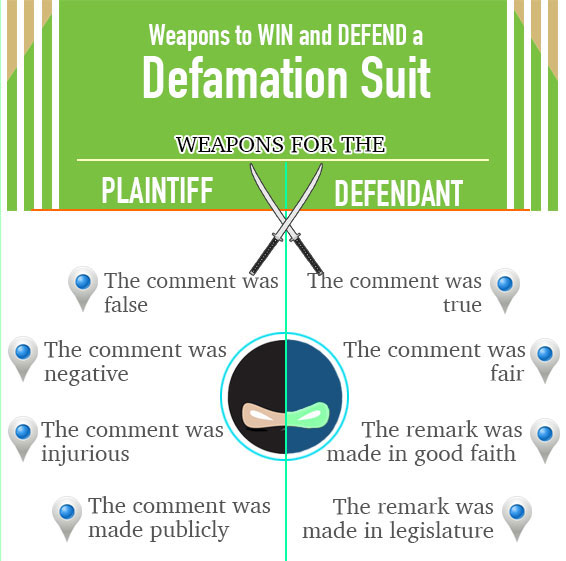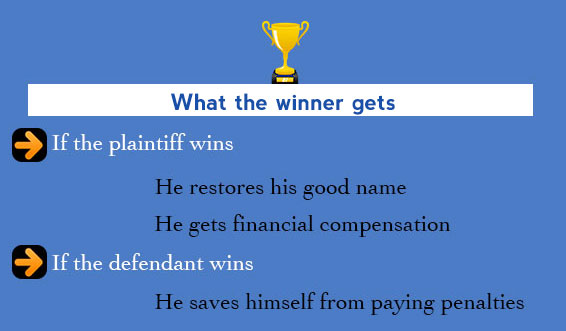“Never try to destroy someone’s life with a lie when yours could be destroyed by the truth.”
In simple words, defamation is a term used when someone tries to hurt a person’s reputation either verbally or in writing. Verbal defamation is known as slander where as written defamation is termed as libel.
Defamation is considered as a civil wrong or a tort. It means no one can be sent to jail for making a defamatory statement.

Plaintiff
Have you decided to sue someone for defaming you? If so, then you have to prove that the statement is all of the following:
1. The comment was false
To win the case, you need to prove that the defamatory statement was false. Some statements can terribly insulting, but they aren’t defamatory. Options won’t be considered as defamatory since they can’t be proved to be false. For instance, a movie critic says, ‘this is the worst movie I watched this year.’ Here the critic is not defaming the movie director because the statement can’t be proved to be false.
2. The comment was negative
You have to prove that the defendant made a negative comment against you.
3. The comment was injurious
The whole idea behind defamation law is to take care of injuries to reputation. If you have filed a defamation suit against someone, then you have to prove that the statement hurt your reputation. For instance, you were fired from your job or your friends have stopped talking to you or you were harassed by the media.
4. The comment was made publicly
You need to prove that the defamatory statement was communicated to 1 person or more people verbally or through gestures or pictures or in writing. Usually, libel is regarded more dangerous than slander since it is a written statement.
You can also take advantage of OVLG's Online Reputation Management Services to protect your good name.
Defendant
So you’ve been sued for defamation. Now, what will you do? Take a deep breath and consult an attorney who will help to defend your case.
1. The comment was true
Truth always prevails. There is no defamation if what you have said is true. Even if you have made a false statement, the attorney will try to prove that you were not aware of the fact that the statement was false.
2. The comment was fair
You won’t be convicted if the attorney can prove that your statement was a genuine opinion or a subject of public interest.
3. The remark was made in good faith
When you make a defamatory statement in good faith or because you have a duty to make a statement, then also you can escape penalty. The statement is protected by ‘qualified privilege’. But this defense won’t help if you have made a statement out of malice.
Some examples of qualified privilege:
- Statements issued by local government officials
- Statements issued in self-defense
- Statements mentioned in governmental reports
- Statements issued by former employer to a potential employer
4. The remark was made in the legislature
Judges, MPs and attorneys can escape penalties by an option called ‘absolute privilege’. When judges and attorneys say something in legal proceedings or MPs make any statement in parliament related to ‘affairs of state’, then there is no defamation. This is a great privilege since attorneys, judges and MPs can escape penalties even if they have made statements out of malice.
A few examples of absolute privilege:
- Statements issued during judicial proceedings
- Statements made between spouses
- Statements issued by senior government officials
- Statements made during legislative debates

What if you win the defamation lawsuit?
If you win the defamation lawsuit, then the court can ask the defendant to:
- Pay a heavy penalty to you
- Publish a correction of the statement
Don't miss out - Defamation - 7 Crucial steps you need to take to file a civil lawsuit









